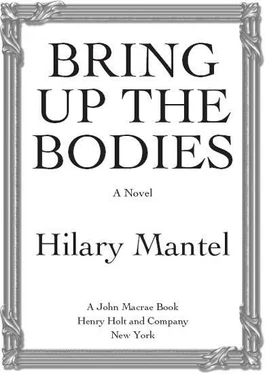Hilary Mantel - Wolf Hall - Bring Up the Bodies
Здесь есть возможность читать онлайн «Hilary Mantel - Wolf Hall - Bring Up the Bodies» — ознакомительный отрывок электронной книги совершенно бесплатно, а после прочтения отрывка купить полную версию. В некоторых случаях можно слушать аудио, скачать через торрент в формате fb2 и присутствует краткое содержание. Жанр: Старинная литература, на английском языке. Описание произведения, (предисловие) а так же отзывы посетителей доступны на портале библиотеки ЛибКат.
- Название:Wolf Hall: Bring Up the Bodies
- Автор:
- Жанр:
- Год:неизвестен
- ISBN:нет данных
- Рейтинг книги:5 / 5. Голосов: 1
-
Избранное:Добавить в избранное
- Отзывы:
-
Ваша оценка:
- 100
- 1
- 2
- 3
- 4
- 5
Wolf Hall: Bring Up the Bodies: краткое содержание, описание и аннотация
Предлагаем к чтению аннотацию, описание, краткое содержание или предисловие (зависит от того, что написал сам автор книги «Wolf Hall: Bring Up the Bodies»). Если вы не нашли необходимую информацию о книге — напишите в комментариях, мы постараемся отыскать её.
Wolf Hall: Bring Up the Bodies — читать онлайн ознакомительный отрывок
Ниже представлен текст книги, разбитый по страницам. Система сохранения места последней прочитанной страницы, позволяет с удобством читать онлайн бесплатно книгу «Wolf Hall: Bring Up the Bodies», без необходимости каждый раз заново искать на чём Вы остановились. Поставьте закладку, и сможете в любой момент перейти на страницу, на которой закончили чтение.
Интервал:
Закладка:
From this massacre the French scattered, and in those days he was French; the King of France paid his wages. He had crawled then limped, he and his comrades dragging their battered bodies as fast as they could from the victorious Spanish, trying to struggle back to ground not bogged with blood; they were wild Welsh bowmen and renegade Switzers, and a few English boys like himself, all of them more or less confused and penniless, gathering their wits in the aftermath of the rout, plotting a course, changing their nation and their names at need, washing up in the cities to the north, looking for the next battle or some safer trade.
At the back gate of a great house, a steward had interrogated him: ‘French?’
‘English.’
The man had rolled his eyes. ‘So what can you do?’
‘I can fight.’
‘Evidently, not well enough.’
‘I can cook.’
‘We have no need of barbarous cuisine.’
‘I can cast accounts.’
‘This is a banking house. We are well supplied.’
‘Tell me what you want done. I can do it.’ (Already he boasts like an Italian.)
‘We want a labourer. What is your name?’
‘Hercules,’ he says.
Against his better judgement, the man laughs. ‘Come in, Ercole.’
Ercole limps in, over the threshold. The man bustles about his own duties. He sits down on a step, nearly weeping with pain. He looks around him. All he has is this floor. This floor is his world. He is hungry, he is thirsty, he is over seven hundred miles from home. But this floor can be improved. ‘Jesus, Mary and Joseph!’ he shouts. ‘Water! Bucket! Allez, allez! ’
They go. Quick they go. A pail arrives. He improves this floor. He improves this house. He does not improve it without resistance. They start him off in the kitchen, where as a foreigner he is ill-received, and where with the blades and spits and boiling water there is so much possibility for violence. But he is better at fighting than you would think: lacking in height, without skill or craft, but almost impossible to knock over. And what aids him is the fame of his countrymen, feared through Europe as brawlers and looters and rapists and thieves. As he cannot abuse his colleagues in their own language, he uses Putney. He teaches them terrible English oaths – ‘By the bleeding nail-holes of Christ’ – which they can use to relieve their feelings behind the backs of their masters. When the girl comes in the mornings, the herbs in her basket damp with dew, they step back, appreciate her and ask, ‘Well, sweetheart, and how are you today?’ When somebody interrupts a tricky task, they say, ‘Why don’t you fuck off out of here, or I’ll boil your head in this pot.’
Before long he understood that fortune had brought him to the door of one of the city’s ancient families, who not only dealt in money and silk, wool and wine, but also had great poets in their lineage. Francisco Frescobaldi, the master, came to the kitchen to talk to him. He did not share the general prejudice against Englishmen, rather he thought of them as lucky; although, he said, some of his ancestors had been brought close to ruin by the unpaid debts of kings of England long ago dead. He had little English himself and he said, we can always use your countrymen, there are many letters to write; you can write, I hope? When he, Tommaso or Ercole, had improved in Tuscan so much that he was able to express himself and make jokes, Frescobaldi had promised, one day I will call you to the counting house. I will make trial of you.
That day came. He was tried and he won. From Florence he went to Venice, to Rome: and when he dreams of those cities, as sometimes he does, a residual swagger trails him into his day, a trace of the young Italian he was. He thinks back to his younger self with no indulgence, but no blame either. He has always done what was needed to survive, and if his judgement of what was necessary was sometimes questionable…that is what it is to be young. Nowadays he takes poor scholars into his family. There’s always a job for them, some niche where they can scribble away at tracts on good government or translations of the psalms. But he will also take in young men who are rough and wild, as he was rough and wild, because he knows if he is patient with them they will be loyal to him. Even now, he loves Frescobaldi like a father. Custom stales the intimacies of marriage, children grow truculent and rebel, but a good master gives more than he takes and his benevolence guides you through your life. Think of Wolsey. To his inner ear, the cardinal speaks. He says, I saw you, Crumb, when you were at Elvetham: scratching your balls in the dawn and wondering at the violence of the king’s whims. If he wants a new wife, fix him one. I didn’t, and I am dead.
Thurston’s cake must have failed because it doesn’t appear that evening at supper, but there is a very good jelly in the shape of a castle. ‘Thurston has a licence to crenellate,’ Richard Cromwell says, and immediately throws himself into a dispute with an Italian across the table: which is the best shape for a fort, circular or star-shaped?
The castle is made in stripes of red and white, the red a deep crimson and the white perfectly clear, so the walls seem to float. There are edible archers peeping from the battlements, shooting candied arrows. It even makes the Solicitor General smile. ‘I wish my little girls could see it.’
‘I’ll send the moulds to your house. Though perhaps not a fort. A flower garden?’ What pleases little girls? He’s forgotten.
After supper, if there are no messengers pounding at the door, he will often steal an hour to be among his books. He keeps them at all his properties: at Austin Friars, at the Rolls House at Chancery Lane, at Stepney, at Hackney. There are books these days on all sorts of subjects. Books that advise you how to be a good prince, or a bad one. Poetry books and volumes that tell you how to keep accounts, books of phrases for use abroad, dictionaries, books that tell you how to wipe your sins clean and books that tell you how to preserve fish. His friend Andrew Boorde, the physician, is writing a book on beards; he is against them. He thinks of what Gardiner said: you should write a book yourself, that would be something to see.
If he did, it would be The Book Called Henry: how to read him, how to serve him, how best to preserve him. In his mind he writes the preamble. ‘Who shall number the qualities, both public and private, of this most blessed of men? Among priests, he is devout: among soldiers, valiant: among scholars, erudite: among courtiers, most gentle and refined: and all these qualities, King Henry possesses in such a remarkable degree that the like was never seen since the world began.’
Erasmus says that you should praise a ruler even for qualities he does not have. For the flattery gives him to think. And the qualities he presently lacks, he might go to work on them.
He looks up as the door opens. It is his little Welsh boy, backing in: ‘Ready for your candles, master?’
‘Yes, more than ready.’ The light shivers, then settles against dark wood like discs pared from a pearl. ‘You see that stool,’ he says. ‘Sit on it.’
The boy flops down. The demands of the household have had him on the run since early morning. Why is it always little legs that have to save big legs? Just run upstairs and fetch me… It flattered you, when you were young. You thought you were important, indeed essential. He used to hurtle around Putney, on errands for Walter. More fool him. Now it pleases him to say to a boy, take your ease. ‘I used to speak a bit of Welsh when I was a boy. I can’t now.’
He thinks, that’s the bleat of the man of fifty: Welsh, tennis, I used to, I can’t now. There are compensations: the head is better stored with information, the heart better proof against chips and fractures. Just now he is undertaking a survey of the queen’s Welsh properties. For this and weightier reasons, he keeps a keen eye on the principality. ‘Tell me your life,’ he asks the child. ‘Tell me how you came here.’ With the boy’s own bit of English, he pieces together his tale: arson, cattle raids, the usual borderlands story, ending in destitution, the making of orphans.
Читать дальшеИнтервал:
Закладка:
Похожие книги на «Wolf Hall: Bring Up the Bodies»
Представляем Вашему вниманию похожие книги на «Wolf Hall: Bring Up the Bodies» списком для выбора. Мы отобрали схожую по названию и смыслу литературу в надежде предоставить читателям больше вариантов отыскать новые, интересные, ещё непрочитанные произведения.
Обсуждение, отзывы о книге «Wolf Hall: Bring Up the Bodies» и просто собственные мнения читателей. Оставьте ваши комментарии, напишите, что Вы думаете о произведении, его смысле или главных героях. Укажите что конкретно понравилось, а что нет, и почему Вы так считаете.












